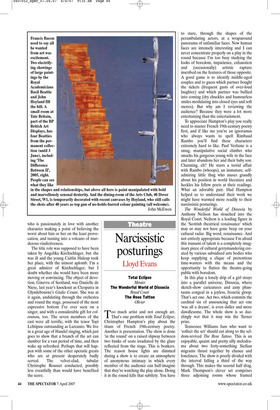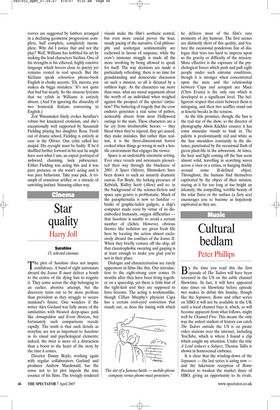Narcissistic posturings
Lloyd Evans
Total Eclipse Menier The Wonderful World of Dissocia Royal Court The Rose Tattoo Olivier
Too much artist and not enough art. That’s one problem with Total Eclipse, Christopher Hampton’s play about the titans of French 19th-century poetry. Another is presentation. The show is done ‘in the round’ on a raised slipway between two banks of seats irradiated by the glare reflected from the stage. This is bonkers. The reason house lights are dimmed during a show is to create an atmosphere of anonymous intimacy in which every member of the audience can half-imagine that they’re watching the play alone. Doing it in the round kills that subtlety. You have to stare, through the shapes of the perambulating actors, at a wraparound panorama of unfamiliar faces. Now human faces are intensely interesting and I can never concentrate properly on a play in the round because I’m too busy studying the looks of boredom, impatience, exhaustion and (occasionally) artistic rapture inscribed on the features of those opposite. A good game is to identify middle-aged couples and to guess which partner bought the tickets (frequent gusts of over-loud laughter) and which partner was bullied into coming (dry chuckles and humourless smiles modulating into closed eyes and soft snores). But why am I reviewing the audience? Because they were a lot more entertaining than the entertainment.
To appreciate Hampton’s play you really need to master French 19th-century poetry first, and if like me you’re an ignoramus who always wants to spell Rimbaud Rambo you’ll find these characters extremely hard to like. Paul Verlaine is a smug, manipulative social climber who smacks his gorgeous young wife in the face and later abandons her and their baby son. Charming, eh? He starts a torrid affair with Rambo (whoops), an immature, selfadmiring little thug who muses grandly about his position in world literature and heckles his fellow poets at their readings. What an adorable pair. Had Hampton helped us to understand their work we might have warmed more readily to their narcissistic posturings.
The Wonderful World of Dissocia by Anthony Neilson has slouched into the Royal Court. Neilson is a leading figure in the ‘Scottish theatrical renaissance’ which may or may not have gone beep on your cultural radar. Big word, renaissance. And not entirely appropriate because I’m afraid this tsunami of talent is a completely imaginary piece of cultural gerrymandering created by various subsidised arts bodies who keep supplying a clique of pretentious time-wasters with the means and the opportunity to flatten the theatre-going public with boredom.
In this play a lonely drip of a girl strays into a parallel universe, Dissocia, where sketch-show caricatures and zany phantasms congeal in a joyless, frenetic gloop. That’s act one. Act two, which commits the cardinal sin of announcing that act one ‘was all a dream’, is even duller and more dawdlesome. The whole show is so dazzlingly wet that it may win the Turner prize.
Tennessee Williams fans who want to ‘collect the set’ should cut along to the seldom-revived The Rose Tattoo. This is an enjoyable, quaint and pretty silly melodrama about two forty-something Sicilian migrants thrust together by chance and loneliness. The show is poorly divided with the interval falling a third of the way through. This makes the second half drag. Mark Thompson’s clever set comprises three adjoining rooms whose framed rooves are suggested by timbers arranged in a declining geometric progression: complete, half complete, completely incomplete. Why did I notice that and not the play? Well, Williams has hobbled his art by making the lead characters Sicilian. One of his strengths is his ethereal, highly emotive language which hovers close to poetry yet remains rooted in real speech. But the Sicilians speak colourless phrase-book English in clunky accents. ‘Eh, meesta, you makea da bigga mistakea.’ It’s not quite that bad but nearly. So the sinuous lyricism that we relish in Williams is entirely absent. (And I’m ignoring the absurdity of two homesick Italians conversing in English.) Zoë Wanamaker finely evokes Serafina’s robust but knackered eroticism, and she’s exceptionally well supported by Susannah Fielding playing her daughter Rosa. Fresh out of drama school, Fielding is entirely at ease in the Olivier. One critic called her insipid. His eyesight must be faulty. If he’d shuffled further forward in his seat he might have seen what I saw, an expert portrayal of awkward, charming, lusty pubescence. Either Fielding was acting this and it was pure pretence or she wasn’t acting and it was pure behaviour. Take your pick. A triumph of conscious artifice or a miracle of unwitting instinct. Stunning either way.



































































 Previous page
Previous page